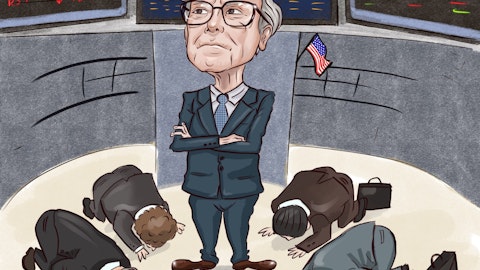In this article, we discuss 5 cheap stocks hedge funds are talking about. If you want to read our comprehensive analysis of the financial markets today, go directly to 10 Cheap Stocks Hedge Funds Are Talking About.
5. Bank of America Corporation (NYSE:BAC)
Price as of March 11, 2022: $40.33 per share
Oakmark Funds, an investment management firm, recently published Bill Nygren’s third-quarter 2021 market commentary – a copy of which can be seen here. In the letter, the fund talked about corporate governance, with a related topic about shareholders vs. stakeholders, and also discussed some great companies to invest in. You can take a look at the fund’s top 5 holdings to have an idea about their best picks for 2022.
Oakmark Funds, in its third-quarter 2021 market commentary, mentioned Bank of America Corporation (NYSE:BAC) and discussed its stance on the firm. Bank of America Corporation (NYSE:BAC) is a Charlotte, North Carolina-based financial services company with a $325.4 billion market capitalization. Bank of America Corporation (NYSE:BAC) shares are down by 9.35% since the beginning of the year, though their 12-month returns are still up by 6.30%. The stock closed at $40.33 per share on March 11, 2022.
Here is what Oakmark Funds had to say about Bank of America Corporation (NYSE:BAC) in its Q3 2021 investor letter:
“Earlier this year, one of our holdings, Bank of America Corporation (NYSE:BAC), announced that it was raising its minimum hourly wage from $15 to $20 and would increase it to $25 by 2025. The company received great press for placing the well-being of its employees above profits. But was it really either/or? Bank of America’s chief human resources officer spoke to the bigger picture: “A core tenet of responsible growth is our commitment to being a great place to work…that includes providing strong pay and competitive benefits to help them and their families, so that we continue to attract and retain the best talent.” Bank of America understood that engaged, high-caliber employees are more productive, less prone to turnover and, therefore, less expensive in the long run. Increasing the pay for employees wasn’t elevating employees above shareholders; it was the right thing to do for employees and for shareholders.
If an increase to $20 was good, why stop there? Why not $50 per hour? Because the benefits the business receives at $50 don’t justify the expense. The bank would no longer be able to price its products competitively and would lose business. The employees would “win” in the short term, but eventually the lost business would lead to job cuts, meaning both employees and shareholders would lose. The negative effects of stakeholder overreach are no different than when CEOs overreach to inflate short-term profits. Both hurt shareholders and stakeholders.”





